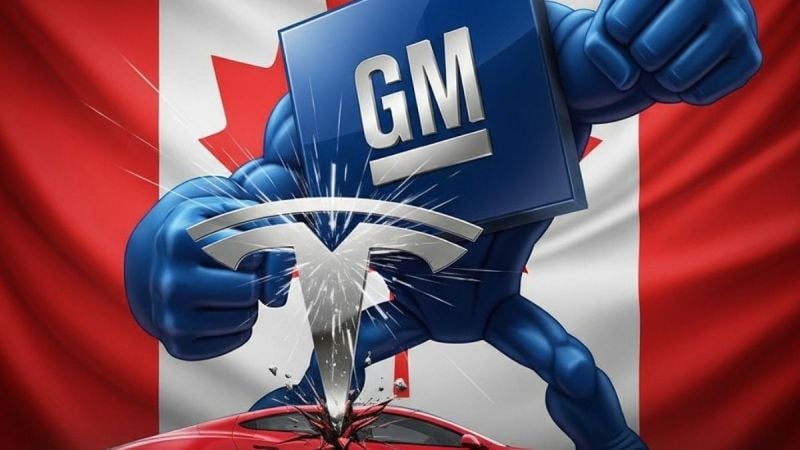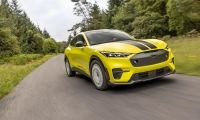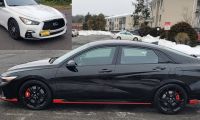The electric vehicle landscape in Canada has witnessed a significant power shift in the first quarter of 2025. General Motors (GM) has surged ahead of Tesla in overall EV sales, marking a dramatic turn in a market that many previously considered to be firmly in Tesla's grasp. This remarkable feat comes on the back of a staggering 252% year-over-year increase in GM's electric vehicle sales, fueled by a compelling lineup of new and increasingly popular models. The vehicles leading this charge are the highly anticipated Chevrolet Equinox EV, the robust Silverado EV, and the stylish Cadillac OPTIQ.
This surge in GM's EV sales contrasts sharply with the fortunes of the former Canadian EV sales leader, Tesla. In a stunning reversal, Tesla experienced an 87% drop in sales, plummeting from 5,097 units in the fourth quarter of 2024 to a mere 534 units in the first quarter of 2025. This precipitous decline points to a confluence of factors that have seemingly impacted the brand's appeal and market position in Canada.
Factors Behind Tesla's Sales Plunge
Several elements appear to have contributed to Tesla's significant sales drop in Canada. One key factor is the suspension of both federal and provincial electric vehicle incentives. Canada's Incentives for Zero-Emission Vehicles (iZEV) program, which offered up to CA$5,000 in federal rebates, paused indefinitely on January 12th, 2025, after allocated funds were fully exhausted. Additionally, Quebec's Roulez vert program, a significant provincial incentive, also saw a temporary suspension. The removal of these financial incentives has undoubtedly made EVs, including Teslas, less accessible to a wider range of consumers, impacting overall sales volumes.
Beyond the economic factors, the actions and public persona of Tesla CEO Elon Musk, particularly his alignment with the current US administration, appear to be taking a toll on the brand's reputation and consequently, its sales in Canada. Marketing experts suggest that Musk's outspoken political views have alienated a significant portion of potential buyers who may not align with his stance. In a market like Canada, which often holds distinct political and social views compared to the US, such brand association can have a tangible impact on consumer preferences.
GM's Winning Strategy: Diverse Lineup and Neutral Stance
In contrast to Tesla's challenges, GM's success in Canada seems to stem from a combination of a more diverse EV lineup and a more politically neutral public image. The Chevrolet Equinox EV, with 1,892 units sold in Q1 2025, led GM's charge GM takes over as the '#1 EV seller' in Canada - Electrek. This affordable electric SUV caters to a broad segment of the market looking for a practical and cost-effective EV option. The Silverado EV, with 894 units sold, taps into the popular pickup truck segment, offering an electric alternative to a traditionally gasoline-dominated category. Finally, the Cadillac OPTIQ, with 615 units sold, provides a compelling entry point into the luxury EV market for the GM brand. This diverse portfolio allows GM to appeal to a wider range of buyers with varying needs and preferences.
While direct evidence linking GM's political neutrality to its success in China is less quantifiable, anecdotal observations suggest that in politically sensitive markets, a less overtly political stance can be beneficial. GM has maintained a relatively low public profile regarding contentious political issues, focusing instead on its products and its commitment to the Chinese market. While GM has faced challenges in China, with an overall sales decline in the previous year, there were signs of rebound in the fourth quarter. This suggests that GM's strategy of focusing on its vehicle offerings and maintaining a less polarizing public image may be resonating with consumers in key markets like China, mirroring its current success in Canada.
Wrapping Up
The shift in Canadian EV market share, with GM surpassing Tesla in the first quarter of 2025, underscores the dynamic nature of the electric vehicle revolution. While the suspension of government incentives has undoubtedly played a role, Tesla's significant sales decline also points to the potential impact of brand perception and the actions of its leadership. GM's success, on the other hand, highlights the strength of a diverse EV lineup that caters to different segments of the market, coupled with a potentially advantageous neutral political stance, which may also be contributing to their performance in other significant global markets like China. This Canadian snapshot serves as a compelling reminder that in the rapidly evolving EV landscape, product diversity, market sensitivity, and even the perceived neutrality of a brand can be crucial factors in achieving and maintaining market leadership.
Disclosure: Picture rendered with ChatGPT
Rob Enderle is a technology analyst at Torque News who covers automotive technology and battery developments. You can learn more about Rob on Wikipedia and follow his articles on Forbes, X, and LinkedIn.
Set as google preferred source











